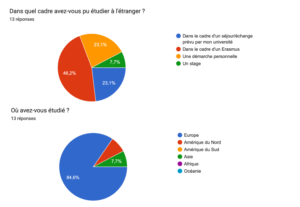Share
Online survey conducted in October 2022
42 participants
The number of students in international mobility is constantly increasing and this poses challenges for both sending and receiving countries, and highlights inequalities between regions of the world.
This questionnaire aimed to highlight general trends in international academic mobility.

95,2% of the participants are European students, it can therefore be assumed that the findings of this questionnaire will reflect a Euro-centric trend in international student mobility.

Here, we see that 69% of people who took part in the questionnaire have already studied abroad, so we can conclude that in the observed sample, it is the majority trend, which is consistent with the general trend of increasing international mobility for students.
The questionnaire was structured in such a way that people who had already studied abroad and those who had never studied abroad did not have the same questions in order to have both points of view on the question.

Here the question was asked to people who had never studied abroad and we observe that the majority of them (72.4%) would like to study abroad. However, most of them specify that they would like to study abroad if it were planned in their course, so we understand the facilitating and decisive role of the universities themselves in this process.

These questions were asked to the people who had already studied abroad, and it can be seen that the frameworks are diverse but that the majority of people went abroad as part of the Erasmus programme. Indeed, the Erasmus programme has a growing popularity, in 2017 there were 303,880 students on Erasmus compared to 159,324 ten years earlier. Moreover, these figures are confirmed by the second graph, which shows that, overall, Europe remains the preferred destination for European students.

It can be observed, however, that the majority of these students who have studied abroad are also considering the option of working abroad. This confirms that studies are part of the general internationalisation process of the labour market in a globalised world.

Students who did not go abroad (left) and those who went abroad (right) seem to have the same observation, the main motivation to go on mobility is above all for personal enrichment.

At last, we observe that students who have been internationally mobile (on the right) are more generally convinced that going abroad has become an almost obligatory step, whereas students who have never been away (on the left) are more mixed and consider that this obligation/pressure does not concern all academic fields. But overall, the vast majority of both groups tend to agree with this statement.



Average Rating